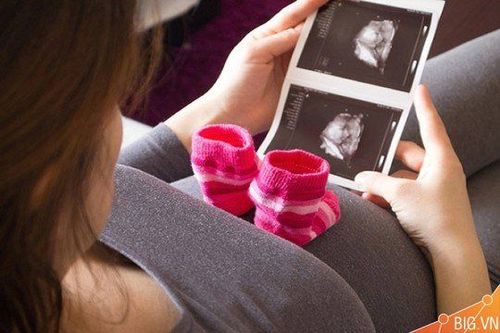This is an automatically translated article.
The article was professionally consulted by Specialist Doctor I Truong Nghia Binh - Department of Obstetrics and Gynecology - Vinmec International Hospital Da Nang.Amniotic fluid is the environment that surrounds and protects the fetus from external shocks. During pregnancy, mothers often see amniotic fluid leaking and causing panic and anxiety. Let's learn about this phenomenon with BSCK I Truong Nghia Binh, an obstetrician and gynecologist at Vinmec Da Nang International General Hospital
1. What causes amniotic fluid leakage?
The amniotic membrane protects the uterus from bacteria from outside. If a pregnant woman has an infection before or during pregnancy, the membrane covering the amniotic sac becomes thinner and thinner, leading to amniotic fluid leakage. Common in pregnant women with abnormal fetal position or pelvis, multiple pregnancy, polyhydramnios.
Gynecological examination during pregnancy is very important but little attention is paid to it. Therefore, when the mother has an infection of the appendages, it is easy to affect the baby.
Trắc nghiệm: Mẹ bầu nên làm gì khi bị thiếu ối?
Nước ối đóng vai trò quan trọng trong sự tồn tại và phát triển của thai nhi. Trường hợp lượng ối quá ít (thiểu ối) thì sẽ tiềm ẩn những nguy cơ như gây thiểu sản phổi, chèn ép dây rốn,... Trả lời các câu hỏi trắc nghiệm sau sẽ giúp bạn có những cách phòng ngừa và điều trị kịp thời.The following content is prepared under supervision of Thạc sĩ, Bác sĩ y khoa, Tạ Quốc Bản , Sản phụ khoa , Khoa Sản phụ khoa - Bệnh viện Đa khoa Quốc tế Vinmec Phú Quốc
2. Distinguish between amniotic fluid and mucus secretion
When amniotic fluid leaks, the liquid is usually white, clear, sometimes with a little mucus or blood, and especially does not have the characteristic odor of urine.When amniotic fluid leak is suspected, the doctor will conduct an ultrasound if the volume reduction is also the basis for the diagnosis.
During pregnancy, due to hormonal changes, the mother's body secretes more vaginal fluid than usual, so many people often mistakenly believe that amniotic fluid is leaking. The closer to the stage of delivery, the more vaginal discharge will be due to the cervix gradually dilating, causing the mucus plug to pop out. This discharge is white, green or yellow, mucus like the nose of a person with a cold, sometimes with a little blood.
One sign of amniotic fluid leakage is that the mother empties her bladder completely, then puts a tampon on her underwear and watches for the liquid to leak out after 1 hour. If you see a yellow liquid, it is urine, if there is no color, it is amniotic fluid.

3. What condition does the phenomenon of amniotic fluid indicate?
When amniotic fluid leak occurs, the amount of amniotic fluid is depleted. It seriously affects the development of the fetus, if prolonged, it will lead to birth defects or fetal distress. In some cases, amniotic fluid leakage combined with uterine contractions leads to premature birth or miscarriage.For the mother, amniotic fluid makes the intimate area moist, creating conditions for bacteria to work and penetrate inside, causing inflammation.
Amniotic fluid leakage persists during the last 3 months of pregnancy, making the amount of amniotic fluid necessary for the fetus to grow slowly, making it difficult for the mother to give birth due to the tight umbilical cord and may affect the baby's ability to take oxygen. risk of caesarean section.
4. What to do when leaking amniotic fluid?
If the amniotic fluid leaks a small amount for a short time, it is a natural physiological phenomenon, but for a long time. Therefore, the best way to prevent it is to:If amniotic fluid leakage is detected, the mother needs to go to a medical facility promptly because when the amniotic fluid leaks, the amniotic membrane will become thinner and at risk. break at any time. In the case of a small fetus, the doctor will prescribe antibiotics to prevent infection of the amniotic fluid, administer fluids and drugs to fight the contractions of the uterus. Periodic antenatal care should be combined with gynecological examination to detect and promptly treat diseases of the appendages to avoid affecting the baby. For mothers with a history of appendicitis or premature rupture of membranes, it is necessary to completely treat the disease before becoming pregnant again. When having this phenomenon, pregnant women need to keep the intimate area clean to prevent infection. Do not have sex, soak in the tub for too long, or douche.

Amniotic fluid leak, if not detected and handled early, will cause many dangerous complications such as: birth defects, fetal distress, fetal growth retardation, difficult birth, amniotic infection, premature birth. Therefore, in the last 3 months, pregnant women should have regular prenatal check-ups to monitor the amount of amniotic fluid, weight and fetal growth. Amniotic fluid leak is easy to confuse with vaginal mucus, the correct diagnosis of amniotic fluid depends on the expertise of the doctor and ultrasound equipment.
Vinmec International General Hospital is a high-quality medical facility that is highly appreciated by customers for its quality of examination and treatment as well as professional services. Vinmec has the most modern equipment system, with advanced ultrasound machines and a team of experienced obstetricians in prenatal diagnosis and intervention to help monitor obstetrics well and detect leakage early. ooh. The fetus is monitored for fetal heart rate and uterine contractions by obstetric monitor from 37 to 40 weeks of expected delivery. After the examination results are available, the doctor will directly analyze and advise on the health status of both mother and baby, suggest improvement and treatment methods suitable for each case.
In addition, to protect the health of mother and baby comprehensively, Vinmec provides a package maternity service to help monitor the health of mother and baby right from the beginning of pregnancy, early detection and timely intervention of problems. health and abnormalities during pregnancy. After the results of antenatal care and testing are available, doctors will analyze and advise on genetics, nutrition, and a reasonable rest regimen for pregnant women to help mothers and babies have the best health, and develop fetuses. overview.
Please dial HOTLINE for more information or register for an appointment HERE. Download MyVinmec app to make appointments faster and to manage your bookings easily.















